LINZ EUROPE TOUR 2007-2009
"You always need two to talk"
Hubert von Goisern made a stop in the Ukraine during his musical exploration of the Danube for the "Linz Europe Tour" project for Linz 2009
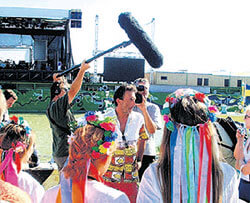 Ukraine
- In response to the question of whether vision and reality meet halfway
having been on the ship for a month, Hubert von Goisern answers pragmatically
on the journey between the Ukrainian venues of Ismail and Vylkove near
the Danube delta: "Exactly so, entirely different. Inside it tastes
the way I dreamed, but in cooking the crust hasn't come out as planned."
Ukraine
- In response to the question of whether vision and reality meet halfway
having been on the ship for a month, Hubert von Goisern answers pragmatically
on the journey between the Ukrainian venues of Ismail and Vylkove near
the Danube delta: "Exactly so, entirely different. Inside it tastes
the way I dreamed, but in cooking the crust hasn't come out as planned."
At the end of June Goisern set off from Wallsee in Lower Austria with an 80-metre-long, 350 tonne ship convoy. As the main project for Capital of Culture Linz 2009 he is travelling the Danube eastwards to the delta in summer 2007 in the framework of a Linz Europe Tour. In a second part in 2008 he will musically explore the waterways to the west, all the way up to Amsterdam. And along the way he and his band are trying on the ship's stage in particular to engage in dialogue with local musicians at each of the stops on the journey.
While in oppressive heat the ship passes rundown lignite harbours and wild and rampantly-growing wetlands, Goisern tells of his impressions from the journey so far. The good 40 people on board (ship personnel, Goisern's band, a film team, the musicians who have just joined them from the Ukrainian band Haydamaky ...) are all trying to politely get into the shade at the same time.
Goisern says that the collaboration between the bands along the Danube has not always worked as well as it did yesterday in front of a well and truly enthusiastic audience of 5000 in the charming, desolate industrial town of Ismail. On the one hand von Goisern enthuses about the exchange over several days with the wild gypsy brass band Karandila in Bulgaria. But previously the communication with the artists invited on board in Croatia proved to be a disaster. From an organisational standpoint too.
Hubert von Goisern: "You always need two to talk. And if there is too little self-confidence on the other side and so too little willingness to start in a dialogue, you have to leave it. We only had disinterest and lethargy to deal with there - aside from the soundcheck and concert, the musicians were then looking for the wild excuses to simply not come on board the ship and turned down opportunities to play together. And the local organiser had neither put up the posters he had been sent, nor informed the press."
The green bullet
A few hundred kilometres downstream in Ismail everything works quite splendidly in contrast. In the afternoon von Goisern was welcomed there by the mayor, who presented him with the green bullet of the city and greeted him with a speech that was as flowery as it was long. During this one learned of the merits of the local wood pulping factory and the universal power of music.
Zdob și Zdub, who come from neighbouring Moldova and who are seen as superstars in the Ukraine and Russia thanks to their participation in the Eurovision Song Contest in 2005, made sure with a rousing concert in the late evening, that Hubert von Goisern's alpine rock sound was subsequently taken up by the audience. Somewhere between a little disconcerted to amused during the yodel passages particularly, but grateful nevertheless.
The technique practised by Zdob și Zdub of combining regional folk music instruments, melodies and dances with rock 'n' roll, hip hop and hard metal guitars in a commercially-appealing manner, as well as tweaking the passionately-loved reggae and ska that they interpret "in the east" as polka, is after all not dissimilar to Hubert von Goisern's approach.
As a joint performance of Hiatamadl shows at the end of the concert, that with rock 'n' roll it is all about what is certainly the greatest of all tools of communication between cultures, aside from the current achievements in the form of Die Hard 4.0, which is being heavily promoted at Hollywood cinemas in the Ukraine too.
Ferocious yodelling here, wild Cossack shouting there: aside from language, the different popular approaches in the regional cultures between Bad Goisern and Odessa form only the ever decreasing sugary crust of a form of musical expression that may no longer exist in 20 years beyond the heritage societies held by the older generation.
Hubert von Goisern may suspect this too. Nonetheless he has worked intensively for years and with substantial use of his own funds on undertaking this journey. Four million Euros is the price of "possibly the last adventure that can exist in Europe". A third of this is being contributed by the Capital of Culture 2009, a third comes from main sponsor Red Bull, a third Goisern has raised himself. He is hoping for the successful marketing of a film to be produced during the journey, with a subsequent DVD release.
A day later the ship is welcomed in Vylkove, known as the "Venice of the East" - which seems a little heady as the tiny channels are dried up in the summer - by youth dance group from Odessa, which includes the local cultural commissary. He gives Goisern a media box brought from Vienna as part of a school exchange programme. Friendship of nations, music is the greatest power. Europe must come together. Good things. And so on.
At the end of the ladder
Shortly before Sascha, the singer from the rock band Haydamaky, who are loved in the Ukraine, martial on stage and melancholy in private, put on the record that together with Portugal the Ukraine is at the lower end of the chicken coop ladder. Bad luck for those who have to live here. A lot of water still has to flow down the Danube for things to consolidate that have not yet managed to do so.
The whole town is then on its feet deep into the night at the harbour for the concert from Haydamaky and Hubert von Goisern. One hears the yodels carried across the water as news of a future, hopefully better world. Hubert von Goisern has no homesickness today for what is familiar to him: "No, I don't miss the mountains from home. The mountains are here. Over past centuries they all washed ashore here in the Danube delta anyway."
"One of the last great adventures"
Hubert von Goisern on the Linz Europe Tour
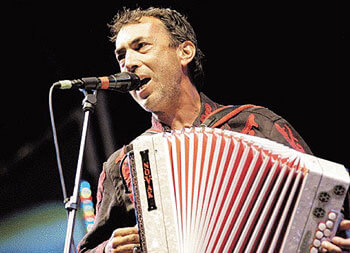 The
aeroplane is younger than I am. And in much better shape. The piston
engines of the 4-propellor DC 6, built in 1958, old-timer crowning jewel
of the fleet belonging to soft drink company Red Bull carries us the
large cemetery to the runway at Odessa.
The
aeroplane is younger than I am. And in much better shape. The piston
engines of the 4-propellor DC 6, built in 1958, old-timer crowning jewel
of the fleet belonging to soft drink company Red Bull carries us the
large cemetery to the runway at Odessa.
During the four-hour bus journey out into the sticks in the Danube delta, the Ukrainian landscape looks a little like Hungary in the 1960s. Without Lake Balaton. But instead with Hubert von Goisern.
He has now arrived at the Black Sea on the "Linz Europe Tour 2007" - part of the programme for the Capital of Culture year. The alpine rocker has fulfilled what was for him "still a distant dream two years ago": to travel down the Danube with a ship full of music.
Adventure
The European river tour is by far the most exciting thing he has done, says von Goisern. The musical varied journey on the water "is perhaps one of the last really great adventures on this continent." "I haven't seen anything as ambitious and large-scale as this in 20 years of working," acknowledges lighting engineer Hans Duchan.
For the mammoth undertaking that has been budgeted as costing 4 million Euros a former cargo ship, 77 metres long, was fitted out with a hydraulically adjustable stage, together with light and sound equipment, its own power supply and two LED walls. Also on board: kitchen, storehouse and living containers. And a white bath is enthroned on the deck of the barracks ship, right next to the satellite dish.
The sun slowly sets over the bulbous spires of the little church next to the harbour in Ismail, down in the harbour thousands of people are waiting with excitement, while on the deck of the "showboat" at the quayside the soundcheck for the musical eastwards expansion is still going on.
Force
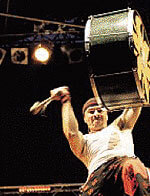 The
explosive brew of the Ukrainian band Haydamaky is
then rooted in folk, taking from punk and reggae too. Zdob și Zdub from
Moldova are no less brilliant, before Hubert von Goisern takes to the
stage after midnight with his new band raps to polka wit the full force
of rock and elevates a yodel to an anthem.
The
explosive brew of the Ukrainian band Haydamaky is
then rooted in folk, taking from punk and reggae too. Zdob și Zdub from
Moldova are no less brilliant, before Hubert von Goisern takes to the
stage after midnight with his new band raps to polka wit the full force
of rock and elevates a yodel to an anthem.
There has never been anything like this. No, here where Europe frays at its outermost edge, people have never seen anything like this. Duchan: "And the people are unbelievably grateful." In fact: In Vylkove, the last town before the mouth of the Danube, also known with affectionate hyperbole as the "Venice of the East", the concert affects the local people like the landing of extra-terrestrials.
The fact that in the course of its history the region has belonged to Russia, Turkey and Romania is reflected in the architecture. And in the music.
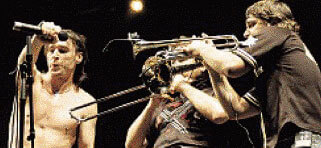 And
the fact that it is not only in theory a uniting element beyond stereotypical
folklore and varying cultural characteristics is proved by von Goisern
to the guests and to the onlookers who are often in the mood for dancing
at each of the two dozen concert stops along the banks of the Danube.
And
the fact that it is not only in theory a uniting element beyond stereotypical
folklore and varying cultural characteristics is proved by von Goisern
to the guests and to the onlookers who are often in the mood for dancing
at each of the two dozen concert stops along the banks of the Danube.
"Music serves the friendship of nations." The interpreter translates the message for the site. "When friendships develop and grow, the same way that a stone thrown into the water will send out ripples, then this continent will also grow closer."
Encounters the Goisern way
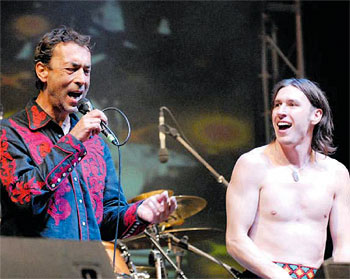 Half-time
on the first leg of Hubert von Goisern's Linz Europe
Tour - the OÖN visited the musical ambassador for the Capital
of Culture 2009 during his encounters in the Ukrainian Danube delta.
Half-time
on the first leg of Hubert von Goisern's Linz Europe
Tour - the OÖN visited the musical ambassador for the Capital
of Culture 2009 during his encounters in the Ukrainian Danube delta.
Meetings often mean tribulations. For three and a half hours the bus rumbles along a brittle, bumpy stretch of asphalt from the Black Sea city of Odessa, through a flat region, through villages that line the roads. Farming families squat on the dusty verge, offering tomatoes, cucumbers and melons from crates and boxes - everything that comes from the earth.
37 days after the 350-tonne ship was sent off from the Brandner dockyard in Wallsee with the old rafting expression "Lasst aus, in Gottes Namen!", the 76.5 metre long floating colossus is anchored in front of the harbour building in Ismail.
Captains and folk music
At a press conference the mayor reads from his notes, speaking of "pride, that our city is connected to world-famous captains" and praises the wood pulp industry. Finally he comes to the "universal language of music", which is needed "where no politicians find a common language.". And to "Mr Goisern" the city leader extends his gratitude for "spreading folk music and strengthening the friendships between European countries."
Meetings occur. As the sun sets red into the water, about 5000 people flood onto the river bank, chiefly to see their bands. The Ukrainian combo Haydamaky play the flute in reggae style, squeeze a ska accordion, drum on a dulcimer. Singer Sascha likes Hubert's approach to living European variety as a unity. "His music," he says, "contains good things, namely a love for his homeland".
The charismatic Roman leads Zdob și Zdub from Moldova, a mood-maker, stirring, rousing party rock. Together with the cultural unifier from Goisern, they drive a fantastic Hiatamadl to the shore. Although the crowd thins a little later, nobody understands the gstanzls like "In Palästina schiaßns a scho wieda, i hoit des nimma aus und sauf mi nieda" ("In Palestine they're shooting again, I can't take it and drink myself into oblivion") - the people dance wildly, cheering, and become quiet and thoughtful when the quiet music starts.
Here is where the idea of the Linz Europe Tour pans out - giving music to the people, forming friendships, tearing down boundaries in people's minds. They search for feeble excuses not to have to go on board. After the concert they do sit together in the "village square" on the barge, "but they only talked among themselves". It didn't help singing the Burgenland-Croatian song they had learned from Willi Resetarits. "Please, just no tonalities," the guests refused.
Unfamiliar contact
In the tranquil Ukrainian town of Vylkove the docking of the musical boat triggers a familiar mass migration. In the afternoon a bus from Odessa approaches with the cultural commissaries, who welcome the Linz ambassador with a folk performance by a youth group. A plump woman sways in rhythm, people on little motor boats abandon themselves to the unfamiliar sounds, which touch them nonetheless.
Early on Saturday morning the 750 horsepower "MS Wallsee" will push the stage and living ship into the middle of the river to continue the concert journey upstream on the Danube, finishing the first stage of the tour with a concert on 1st September in Linz. An encounter in which you should get involved.
Hubert von Goisern: "Inside it tastes just like I dreamed"
The OÖN spoke to Hubert von Goisern in a shady corner of the ship convoy, on the journey along the Danube between Ismail and Vylkove
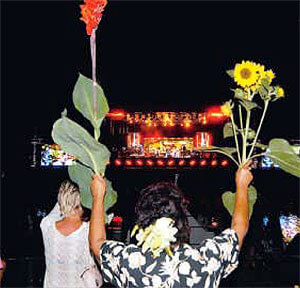 How
has it gone with the groups so far?
How
has it gone with the groups so far?
There's so little self-confidence there. You have to feel confident for a meeting. I think it's a thing of trauma and I don't blame them at all. We needed more time. But pretty slowly we're winning trust in our efforts to break through.
Have musicians you've invited on board reacted to the Tibetan prayer flags that decorate the "village square" on the ship?
One of the members of the Ukrainian band Haydamaky told me that he was a Buddhist. He wanted to know which branch I belonged to. I told him 'none', I'm still a mosquito-killer.
How do you feel about the fact that the regional bands are the real main act for the audience?
With age comes a kind of wisdom that you really have to withdraw in such situations. We are hosts and are giving the others everything we have. It wouldn't do at all if we were to appear as the most important and the best.
You can't communicate with the audience with language...
It's really terrible for me that I can't speak to the people, it's a test. You really have to manage with the music.
At home there is constantly the same question: what does this all have to do with Linz?
They should think about it, meditate on it and not constantly demand answers. If you can't imagine it, it's no use trying to explain it either. It's envy and envy is a pain.
Borders are choking culture
Interview with the Austrian musician Hubert von Goisern and Zdob și Zdub's lead Roman Iagupov
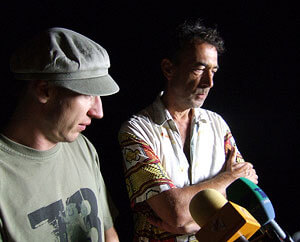 The
Austrian musician Hubert von Goisern is the initiator of the Linz
Europe Tour 2007-2009 project which plans to bring together musicians
from different countries crossed by the Danube. The artists board a ship,
where they live and create shoulder to shoulder; from time to time they
drop anchor in one of the 20 harbours along the Danube, transform the
ship into a stage equipped with advanced sound systems, lights and monitors
and get the show started.
The
Austrian musician Hubert von Goisern is the initiator of the Linz
Europe Tour 2007-2009 project which plans to bring together musicians
from different countries crossed by the Danube. The artists board a ship,
where they live and create shoulder to shoulder; from time to time they
drop anchor in one of the 20 harbours along the Danube, transform the
ship into a stage equipped with advanced sound systems, lights and monitors
and get the show started.
They reached the harbour of Ismail on July 26. The show featuring the famous Zdubs was also attended by Info-Prim Neo's reporter.
It takes a lot of courage to start such a project. How did you make up your mind to take so much responsibility?
Hubert von Goisern: The project is an old dream of mine and nobody believed in its success in the beginning. I have been working a lot, and now I see it coming true. We got on board the ship and set sail downstream the Danube. The main goal of our project is to meet with musicians from different countries and different cultures so as to enable the desired exchange of experience. We started our journey on June 22 from Vienna and we anchored in Melk and Passau, Orsova, Braila, and Galati (Romania), some cities along the Danube in Bulgaria, and then we'll return to Romania - Tulcea and Sulina. Next on the list are Budapest, Belgrade, Novi Sad, and Bratislava. We will end this summer with a concert in Linz (Austria). For the next summer we will set sail for the cities upstream from Linz, until we reach the North Sea. The whole project will end in 2009 with a mega-show in Linz, Europe's cultural capital, which is going to bring together all the bands involved in the project. This way we intend to enlarge eastward the cultural partnership of the regions along the 2889 kilometre long river. Music has always been a uniting element that knows no bounds, and cultural connections can lead to a better understanding between peoples.
Roman Iagupov: The music freed Hubert and he is now sharing his freedom with other people. We interacted a lot. We had rehearsals together and we even played together. For us the Danube is a natural phenomenon which shouldn't be affected because of the civilisation, neither should it have borders along it. The Danube needs to be free. Music is a language that everyone can understand, no matter where they are from. Music should travel with no visas, no borders and without being stopped by barbed wire. I am tired of borders, of having to explain who I am, where I am going, who I want to sing for; I am tired of the stamps in the passport and of everything that limits people's freedom.
Hubert von Goisern: The way Europe lives and its attempt to unify is very important, exciting and even amusing. However, compared to the US, Europe is more ethnically and culturally diverse and it has more traditions. That is why it is obvious that in its aspiration for unification each country must keep its own culture. Nobody has the right to give away their principles, their traditions and their dignity as a people. The culture has to maintain peace among peoples. To be able to accept this musical diversity as one would be a great achievement.
Has anyone before tried to implement a project of this kind?
Hubert von Goisern: During the last 10 years there have been 15 attempts to realise a project like this, but it is not easy to create a project as big as this one. Apparently I was really lucky to go on with this project. In the 60s and 70s there was a project similar to this one, but it wasn't as great and it had a different purpose.
How did you choose the bands to play in the concert?
Hubert von Goisern: We went through two research steps in order to select the bands. Firstly we chose the bands that I liked the most, which have the same vibes as I do. I didn't make the choice based on logics or strategies, I just followed my heart. It was important to reach good communication so that we can collaborate in the future. Another requirement was that the band be from a place along the itinerary of our ship.
How did the people receive you where you went?
Hubert von Goisern: Oh, I have very nice impressions. This event was worth the effort even if there were a couple of towns that didn't impress me much and that I don't want to remember. Everything has been going very well and I am glad that I took this adventure.
What attracted you to this project?
Roman Iagupov: The project is phenomenal by itself. I think that there is a lot of room for improvement in the show business in Eastern Europe. There aren't too many valuable performances produced in Moldova, Ukraine or Romania. The best shows happen in the rest of Europe. Though there are a few shows like that around here, they are popular mostly from the commercial perspective. Hubert's project made me feel like a musician who can communicate artistically with other valuable musicians, who can accomplish his artistic potential within important cultural projects. This is how experience exchange happens; this is how we can feel the spirit of freedom, the spirit of Europe and the spirit of a high culture. And that's the most important thing. I am bored of participating in mechanical concerts where you cannot learn anything, and where you don't feel any spiritual satisfaction or artistic fulfilment. We have just started our collaboration. We intend to create some songs together and one video clip to leave to those who come behind us. A modern combination of the Austrian folk with the Romanian folk could generate a pretty interesting result. We will achieve something that even the politicians don't manage to get.
What else are you working on apart for the concerts for the "Linz Europe Tour 2007-2009" project?
Roman Iagupov: We actually have very many concerts, most of them open air. The next week we will go to B'ESTIVAL, in Romania. We also have concerts in Ukraine, Russia, Romania and we will start our tour through Germany soon. We are travelling all the time. We would like a break when we could go to our studio and record some new songs, but our tour schedule is very busy, and we don't have time for that right now. We hope that we will be able to record at least the song that we created with Hubert von Goisern.
That was an impressive collaboration. How long did you work for the song?
Roman Iagupov: In March Hubert spent 5 days with us and this is when everything began. We also had a few rehearsals before concerts. Everything worked out that well because we planned everything.
In fact the Zdubs played a couple of songs together with Hubert. Among them there was Miorita (a song from the band's repertoire), one song of the Osoianu Sisters which was performed by the girls in Hubert von Goisern's band and one song from the Austrian band's repertoire.
Aren't you tired of travelling this much? Aren't you tired of the tour?
Hubert von Goisern: No, I am not tired. People and music give us so much energy that we don't have time to get tired. It is good to be resonant; otherwise people might think that you are not enjoying what you are doing. In different places people have different mentalities and they react differently. I am glad that I have been with these musicians for 6 weeks already, that we are travelling on the Danube and it has some sort of purifying energy. The Danube scares away the bad spirits and keeps us in a good mood.
Roman Iagupov: Here is where I understood that love and freedom are not myths and that they really exist. Hubert has a unique philosophy, and the more I talk to him, the more I realise these truths. Life is not only difficult, with a lot of problems; I saw the beautiful side of life too. This interaction with Hubert has been a very good experience for me.
Hubert von Goisern: Live in Ismail - 26th July 2007
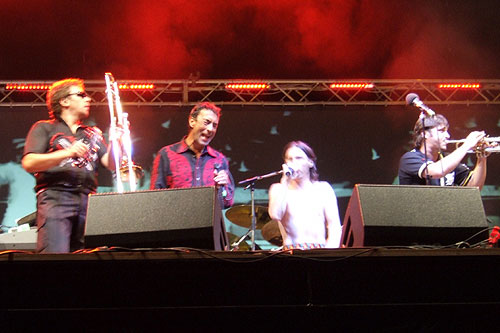
Hubert von Goisern: Live in Ruse - 18th July 2007
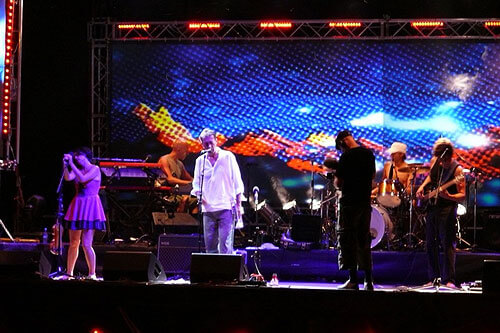
A furious Hubert von Goisern
Silistra - While on his Danube tour with a floating stage, Hubert von Goisern has tangled with the local "power" in the Bulgarian town of Silistra. His ship was docked in front of the luxury Drustar hotel. It had been arranged with the hotel owner Stefan Rajtschew that the restaurant tables would be removed for the concert to make room for the audience. However the hotel boss, who owns nearly all of Silistra, nonetheless reserved tables for invited guests. Von Goisern did not stand for this. The stage ship was taken 300 metres upstream, where in front of an enthusiastic crowd the concert became a yodel so to speak against the "Mafia". Von Goisern's Linz Europe Tour takes in 22 concerts down to the Danube delta and ends in Linz on 1st September.
Hubert von Goisern: Live in Osijek - 8th July 2007
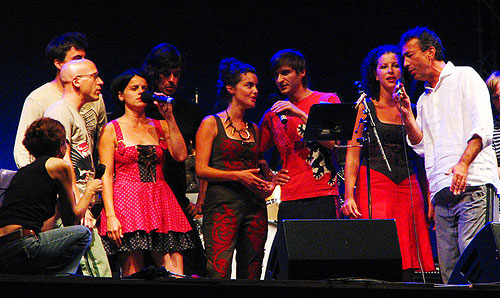
HvG & Band with Tamara Obrovac | More photos at www.osijek031.com
Approaching the riverbanks with care
The convoy of ships is powerful. The idea needs care. A report on the first East concerts on Hubert von Goisern's Linz Danube tour. Bernhard Flieher reports from Vukovar.
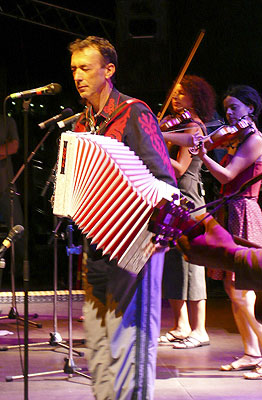 The
approach is taken little by little. It has to be done with care. No excessive
movements, no rushing that could that could take the positive strength
of the tension on hand. Where new land is broken, the terrain must be
cautiously sounded out. Captain Peter lands the ship in Vukovar at a
steep promenade. This evening the audience will sit in the castle grounds,
among buildings damaged by gunfire. Only last year was the ferry that
joins Croatia and Serbia reinstated. For a good fifteen years after the
end of Yugoslavia and the war, the Danube was a powerfully rolling force
that kept countries apart.
The
approach is taken little by little. It has to be done with care. No excessive
movements, no rushing that could that could take the positive strength
of the tension on hand. Where new land is broken, the terrain must be
cautiously sounded out. Captain Peter lands the ship in Vukovar at a
steep promenade. This evening the audience will sit in the castle grounds,
among buildings damaged by gunfire. Only last year was the ferry that
joins Croatia and Serbia reinstated. For a good fifteen years after the
end of Yugoslavia and the war, the Danube was a powerfully rolling force
that kept countries apart.
Osijek: The start after the storm
Hubert von Goisern is travelling along this border to the east: the huge undertaking is called the "Linz Europe Tour 2007-2009". The convoy of ships - about 110 metres long, consisting of a tugboat, barracks ship and a barge, on which approximately 60 tonnes of stage, technical equipment, kitchen, storage and additional sleeping containers accommodated - is going east this year, in 2008 it will travel the west. In journeys of three months each, a good two dozen concerts will be given with a variety of local musicians. In 2009 the stage ship will dock in Linz for a final festival as part of "Linz 2009 - European Capital of Culture".
The path of the tour along the Danube leads from the present to the past, from highly-developed industrial nations to structurally weak rural areas of hope. Osijek, 130,000 inhabitants has found the connection. Some bullet holes remain in the wall of a fortress-like building as the last witnesses of street fights during the Croatian war. You can see them clearly from the Copa Cabana open-air swimming pool on the other side of the river. 15 kilometres from here the Drava river still exists independently. Then it is swallowed up by the Danube. Sunday afternoon, 36ºC, Osijek goes swimming. The embankment drops away in steps from the pool to the river, where the Goisern convoy is anchored and attracts amazed looks. The stage is the size of one used for festivals. It is raised from the belly of the cargo ship for each show. The first concert in the east is being played in Osijek. This is not the only reason an endurance test lies ahead. It is the first time that all the equipment brought together for the tour will be used. Everyone is sweating - not just because of the heat. The technical crew are sweating the most - and have been for days. It is a sweat of worry and work.
A look back upstream: The storm is coming
Vienna, Melk, Regensburg and Passau were the first stops. That was familiar terrain. That can serve promotion well just as it can the a finding of security in the interaction of all forces. The stage was only ready shortly before the first show. It was rigged for the first time at the end of June for the concert on the Donauinsel. The storm came two hours before the start of the show. All is lost. But on such a tour only the perfecting functioning of the combination of ship and equipment allows for the free space in which human and artistic approaches can be made.
In the past year and a half Hubert von Goisern travelled the Danube countries for discovery, but above all for organisation. Boundaries must be overcome, and for that customs officers, police or port authorities always need papers - and the Goiserer needs patience. The effort doesn't stop on board either. And in the end one is also dependent on the incalculability of the water. Casting off. Making acquaintances. Wonderful ideas. But how will that work when the ship is a workshop and the basic idea of bringing about meetings with music beyond all borders takes a backseat?
It counts from Osijek. And Osijek gives hope. Everything works. Tamara Obrovac, poetic jazz artists from Slovenia, opens the evening and joins in on two of the Goiserer's songs. The path into the past that this journey presents looking at the countries to be travelled underlies the journey too.
The Goiserer had the idea for such a tour on water in Africa on Tanganyika Lake. That was back in the nineties, shortly after the end of the Alpinkatzen, with whom he had become famous. Now he has a new band who play in Osijek just as vigorously as the Alpinkatzen once did. But many nuances are finger, the repertoire is broader, the view goes further afield and yet everything stands more firmly on alpine soil than it did on Fön (1999) and Iwasig (2002), the first albums after the time of the Alpinkatzen. Foreign terrain is fought for with old virtues. It is not so much a broad, enriched world of sound between Tibet and Africa, but more a concentrate of Goisern's creations hitherto: alpine rock that offers an operatic voice room almost as easily as it does meditative onomatopoeia.
Vukovar: on the ferry to hopes
Around 200 people sit attentively in the castle grounds in Vukovar. No, he's never heard such music, says Josip. That morning he had told me in the Café Lav on the market square about the time when Vukovar was besieged by Serbian troops between May and November 1991. Not a single house in the harbour town with 30,000 residents was spared the shelling. Vukovar became a symbol of the senselessness of the war. It is still a city of holes. Even in the city centre, where a great deal is being reconstructed, yawn great holes where houses once stood. In the neighbouring streets houses stand empty, riddled with bullet holes. Shrubs grow from roofs. A ruined shopping centre and the deserted castle grounds on the Danube promenade above remain as memorials. They look out over the river to Serbia, from where Vukovar came under fire.
In the evening the castle is illuminated by the light from the giant LED walls next to the stage. The Goiserer's accordion takes its first breath and begins Solide Alm. When you look past the screens into the darkness over the Danube, you can see two lights on the other bank. That is where the ferry is moored. "I've never been there" says Josip, as Hubert von Goisern sings the song Strassn (Roads). What is he singing? Josip wants to know. That it is the same roads that lead you home or away. Josip thinks that it nice, but: "Sometimes it isn't possible for you to come home." At the concert in Vukovar the Goiserer replaces the word "roads" with the word "water".
Staying on the river: the next bank awaits
At dawn the convoy has set off along the Danube for the concert in Osijek. The dense meadow all around protects the river and the ship. The sun comes up just before the outlet of the Drava into the Danube. The light of the red ball falls upon the mist that has arisen due to the difference in temperature between the air and the water. The rays warm and give hope. A few hours later, there are still hours before the concert in Vukovar - Hubert von Goisern looks across the Danube while the careful docking manoeuvres are made. There is a small sandy beach between the alluvial forests. "We're always docking at the wrong bank", he says with a grin. There is no disappointment in these words, but rather the desire for the other side, for the next step. The ship will cast off. Yesterday, Wednesday, the concert location was Donji Milanovac. It is not be found on any tourplan. The concert was a spontaneous addition. The mayor of the village of 300 inhabitants was delighted. The next approach takes place. What will it be like? Careful certainly.
